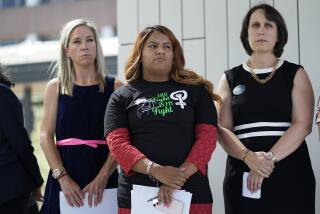Series explores racism in film
- Share via
When the Silent Movie Theatre in Hollywood scheduled a screening of D.W. Griffith’s “The Birth of a Nation” in 2004 to launch a series of rare and notable silent films, protesters created such an uproar that the owner of the venue, who received threats of violence, canceled the event.
That was just another example of the explosive reactions provoked by the 1915 film for its glorification of the Ku Klux Klan and its depiction of blacks as buffoons and villains. “Gone With the Wind,” “The Jazz Singer” and “Uncle Tom’s Cabin” are other classic movies that have prompted concerns among filmgoers and historians regarding minority images they say are racist.
Those films and others will be featured during Turner Classic Movies’ series “Race & Hollywood: Black Images on Film,” exploring concepts, stereotypes and images of African Americans in Hollywood movies. It launches at 8 p.m. Tuesday and will air every Tuesday and Thursday evening through May 30. The retrospective is designed to give viewers a historical perspective and commentary surrounding historical depictions of blacks.
The festival kicks off with “The Birth of a Nation,” which the network last aired more than seven years ago. Other scheduled movies include “Hallelujah,” “A Day at the Races,” “Imitation of Life,” “Show Boat,” “In the Heat of the Night,” “Sounder,” “Shaft” and “Superfly.”
Film historian Donald Bogle and TCM’s Robert Osborne will host and discuss the films, while celebrities such as Bill Cosby, James Earl Jones, Cicely Tyson, Charles Dutton and Richard Roundtree will offer commentary.
Charlie Tabesh, the channel’s senior vice president of programming, said viewers have often complained about the airing of old films that “have some pretty upsetting and disturbing images and stereotypes. We don’t edit the films, and we try to be sensitive to that.”
After talking with scholars on the issue, Tabesh said he thought it would be a good idea to put those films and the controversy into a serious context “as an attempt to trace Hollywood’s relationship with the African American community, not only where we’ve been, but where we are and where we’re going.”
-- Greg Braxton
More to Read
Only good movies
Get the Indie Focus newsletter, Mark Olsen's weekly guide to the world of cinema.
You may occasionally receive promotional content from the Los Angeles Times.










